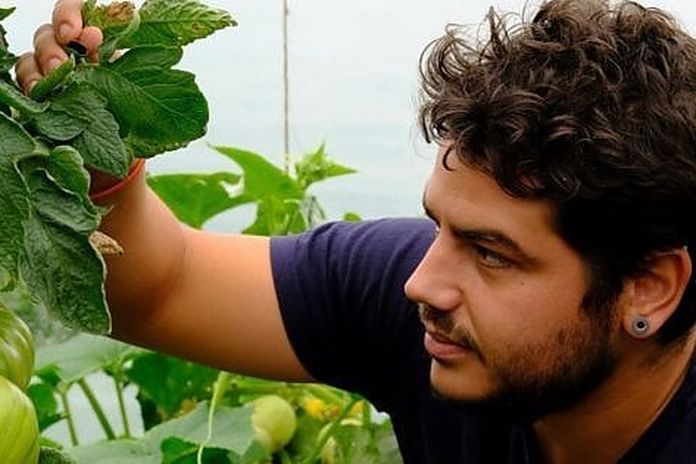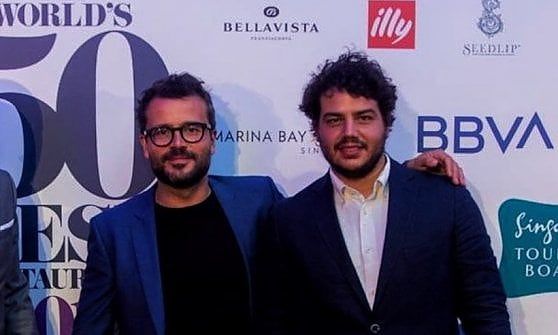«My name is Alessandro Perricone, I live in Copenhagen since 2012, I’m 30, and I’m a sommelier and restaurateur». This was the incipit of an article we published on these pages little over one year ago, signed by a young Italian professional very active in the Danish restaurant business. Perricone was also one of the guests of the last edition of the Identità Golose Congress, within the Identità di Sala programme: during his fast and brilliant career he became the restaurant director at Christian Puglisi’s Relæ, and they then became business partners. So today he’s co-owner of three restaurants (Relæ, Manfreds and Bæst), a bakery (Mirabelle), a business that imports and distributes wines from Italy, France and Spain (Vinikultur), an organic farm (Farm of Ideas) and the first vermouth bar in Copenhagen (Rudo).
We called him to understand what is happening in Denmark in these difficult weeks for all the world, due to the Coronavirus emergency, and he offered an undoubtedly useful and interesting point of view. When we called him on the phone, he first told us of a less harsh situation, compared to what we’re experiencing in Italy.
«Here we can move freely – says Perricone – there’s only social distancing so only groups of more than 8 people are forbidden. The crisis has hit us in a softer way, compared to Italy, and we had the advantage of seeing what was happening in other countries. Thanks to this, the timely measures imposed by the Danish government had a good effect, there was never a total lockdown, we only did social distancing and damages were thus contained. Since Wednesday schools have reopened, with some special precautions for children under 11».
So, do you think the steps taken by the Danish government were good?
It was a strong and timely intervention, even in financial terms. They offered substantial support, first to small businesses, then to all the others. Until June very many businesses that will be supported.
So are they supporting you too?
I must confess we were not expecting to receive this support: of our different places, we immediately closed Relæ and Rudo, while with Manfreds and Bæst we were offering take away. The first is a bistro-wine shop with kitchen, and we were already offering take away for a while. For Bæst, where we serve pizzas, it was a novelty, but it proved very successful. Then funds arrived and in order to receive them, we decided to close these two restaurants too. We have a total of 130 employees, with take away it wouldn’t have been possible for us to keep them all, while with funds, at least until June, we can avoid to leave anyone at home. The place that is still open is bakery Mirabelle, which has now turned into a grocery shop. On top of bread we also sell products from our farm: we had never sold them to private clients for the simple reason that we used them all in our restaurants. Now we sell vegetables, cured meat, cheese, mozzarella, on top of bread and various leavened products. We’re having a big success, so much so that we’re studying to what extent we can increase the production of our bread: each day we have a very long queue of people waiting to enter Mirabelle, where we accept one customer at a time.
What do you plan to do for the reopening of a fine dining restaurant like Relæ?
It’s a place that was born at the end of a difficult time, in 2010, after the 2008 crisis: there was little money around and the place originates from some compromises. It’s a little soon to say what will happen in the future. For sure it will be a place run for few people, which will work in a creative way. We’re discussing this at length, but it’s too early to have a definite plan. After all, we don’t know well what we will be allowed to do or not. Imagination works, though: for instance, I thought that we can visit people in their homes, with a cook and a service manager, and cook for a group of up to six people, given the limitation of 8 people per group meeting. But the issue is not just to understand when we will open again...

What is the problem then?
The following question is: when we will open, will people want to go to the restaurant? Because if you look at Sweden, which didn’t have a real lockdown and where restaurants are still open, tables are almost deserted everywhere. As for delivery, instead, we’re trying to find how to replace the delivery services, because the fee they get increases the price the client will pay sensibly, so we’re testing the logistics so that we can take care of this directly. But this is a time of research.
Are you sharing ideas with your colleagues?
At first, there was a very strong exchange. Christian and I are known for being people with rather structured ideas, so many colleagues called us to ask us what we had in mind. I must say that we tried not to influence the people with whom we spoke, we tried to make our own decision, because there were many doubts, and there still are. So we didn’t want to make the wrong choice and influence others in this sense. For sure it’s a difficult time because Copenhagen is a very demanding market for restaurants, perhaps there are even too many. Some were struggling even before the crisis. I think that there will be even more difficulties when we’ll be able to open again. For Noma, for the élite of fine dining, in other ways, there will always be a place. But what about all the other restaurants that do fine dining? I’m afraid there will be less. Having said this, I also believe we might see some positive aspects from this situation...

With Christian Puglisi at the ceremony for the World's 50Best
Like what?
Speaking with the students of gastronomic sciences from the Università di Pollenzo, where I have the honour of teaching, I told them that this can also be a stimulating time for someone who is studying to work in the restaurant industry. Because if we leave behind us all the difficulties and the pain of this time, if you’re a student who’s about to approach a world in which restaurants must be reconsidered in a substantial way, I think there can be some interesting opportunities, where ideas will win. We’ll need ideas and imagination. In particular, I imagine "stage two" in Italy as rather similar to our "stage one", hence a country that applies social distancing, in which restaurants are closed but both take away and delivery are possible. So, if one can imagine a winning format for this “stage two”, it could well be an opportunity worth making use of.
Translated into English by Slawka G. Scarso